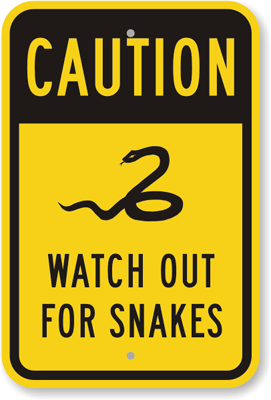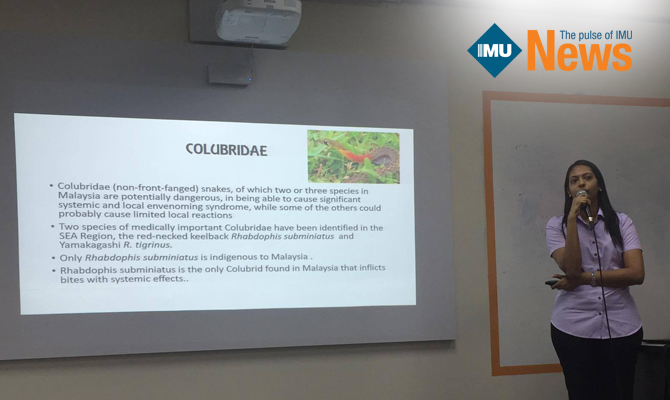13 September 2016- A talk hosted by Malaysian Pharmaceutical Society Young Pharmacist Chapter (MPS-YPC) and IMU Alumni for the month of September 2016 was entitled “Snake Envenomation Treatment”. It is our honour to have Kavidha Mohan as our speaker who is a clinical pharmacist from the Emergency Department in Hospital Kuala Lumpur. Kavidha Mohan graduated with a Bachelor’s degree in pharmacy from Universiti Sains Malaysia. The talk was held at International Medical University, Bukit Jalil. The talk started with a brief introduction of snake and snake venom. There are 3 categories of snake in Malaysia which are Elapidae, Viperidae and Colubridae, while the type of venom are hematoxin, neurotoxin, myotoxin and cytotoxin. In Malaysia, not much data was found on the prevalence of snake bite, but there were 55000 snake bite cases reported in 1958-1980. Generally, the mortality of snake bite is low but long term morbidity is high. Kavidha also shared some tips on snake identification based on colour, scale, geographical distribution of a snake, and knowledge of pattern of activity.  Kavidha shared some basic first aid for a suspected snake bite, which includes avoiding interfering with the bite wound by tourniquet or sucking. When there is a suspected snake bite, laboratory tests will be required for further investigation to make a confirmed diagnosis. Examples of tests held are 20 minute whole blood clotting test, examination of the bitten part and general examination of the patient’s condition. General management of snake bite was also discussed, from cleaning the bite wound with saline water to giving anti-venom to the patient. In Malaysia, all the anti-venom are from Thailand and they are available in Haemato polyvalent, Neuro polyvalent and Monovalent. During the talk, Kavidha brought up concerns about the availability of anti-venom in Malaysia. The anti-venom in Malaysia are only kept by government hospitals, while private hospitals do not keep it due to the high cost. This is a concern especially to staffs in institutions who keep venous snakes, like the zookeepers, who interact with snakes without having antidote in case of a snake bite.
Kavidha shared some basic first aid for a suspected snake bite, which includes avoiding interfering with the bite wound by tourniquet or sucking. When there is a suspected snake bite, laboratory tests will be required for further investigation to make a confirmed diagnosis. Examples of tests held are 20 minute whole blood clotting test, examination of the bitten part and general examination of the patient’s condition. General management of snake bite was also discussed, from cleaning the bite wound with saline water to giving anti-venom to the patient. In Malaysia, all the anti-venom are from Thailand and they are available in Haemato polyvalent, Neuro polyvalent and Monovalent. During the talk, Kavidha brought up concerns about the availability of anti-venom in Malaysia. The anti-venom in Malaysia are only kept by government hospitals, while private hospitals do not keep it due to the high cost. This is a concern especially to staffs in institutions who keep venous snakes, like the zookeepers, who interact with snakes without having antidote in case of a snake bite.
This alumni talk was informative and beneficial for the audiences as they get to know more about snake venom. Most of them found this talk interesting, and one of the participants, a pharmacy student found that the information about Remote Envenomation Consultation Services Malaysia (RECS) was useful as it may be helpful when there is an urgent need of anti-venom.









